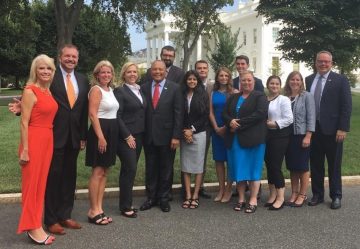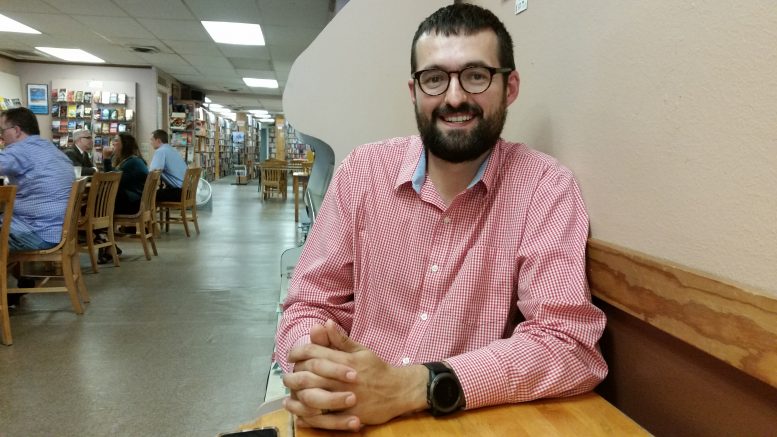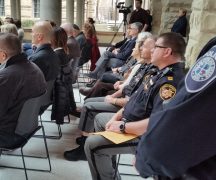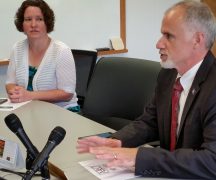By JAN LARSON McLAUGHLIN
BG Independent News
Preventing drug and alcohol abuse is not a political issue. Milan Karna saw that firsthand this week as he attended a roundtable discussion hosted by President Donald Trump at the White House.
Karna, coordinator of the Wood County Prevention Coalition, was asked to attend the 20-year anniversary of the Office of the National Drug Control Policy’s Drug-Free Communities Support Program grant awards in Washington, D.C., on Wednesday. Karna was one of six grant recipients present from the 731 programs in the nation.
The programs – which work to prevent drug and alcohol abuse by youth – were awarded $90.9 million. The Wood County Prevention Coalition’s piece of the pie was $125,000.
This is the fifth year for the local coalition to receive federal funding.
“The coalition is neutral,” Karna said. “It’s public service for the betterment of the entire community.”
Karna was gratified that the current administration appeared to understand the value of the prevention programs.
“I understand people have different feelings about different political figures,” Karna said. Both Ohio senators Sherrod Brown and Rob Portman have been long-time supporters of funding the programs – but the support of the administration was unproven.
“It was encouraging to hear this administration has agreed to allow this program to continue,” Karna said.

Members of six prevention coalitions meet with national leaders.
During the roundtable discussion, youths from some of the prevention coalitions spoke of the reasons behind their commitment to the cause. President Donald Trump shared his personal story of his brother’s alcohol addiction.
“He seemed very sincere,” Karna said. “I could sense that he was personally affected.”
Karna has his own personal story that spurs his efforts to prevent drug and alcohol abuse. Karna’s father had issues with alcohol and tobacco. He was able to quit drinking – but had a much tougher time with smoking – even after undergoing a quintuple bypass.
“He was asking my brother and me for cigarettes,” shortly after the surgery, Karna said. His father, who grew up in Yugoslavia, started smoking at age 5. He died in 2012 at age 72.
“I think that’s something that drives me,” Karna said.
It’s a motivator for many.
“I think this is an issue a lot of people care about. There is a lot of grief and energy to do something,” Karna said.
That may be why the issue has the ability to cross political lines.
“Prevention is something we should all be able to rally around,” Karna said. “Prevention is often talked about, but when push comes to shove, it’s not always supported. We believe our youth are the most valuable asset. Prevention should be supported.”
The Wood County Prevention Coalition will use the federal grant funding to continue its efforts such as:
- Working on environmental strategies with law enforcement
- Surveying local youth to get useful data on substance abuse.
- Providing training for professionals.
- Screening to help identify substance abuse.
Those prevention steps have focused on lowering use of prescription drugs, marijuana, tobacco and alcohol by local youths. The success has been shown in annual surveys given to teens in the county.
Annual alcohol and marijuana use among local high school seniors has decreased by approximately 26 percent and 16 percent respectively since initial federal funding to the Wood County Prevention Coalition.
“Prevention is a powerful tool to counteract drug use in our community, and this funding will continue to help youth in Wood County make healthy choices about substance use,” Karna said.
Karna was able to share Wood County’s success with others present at the Washington, D.C., event.
“I talked their ears off,” he said.
“It’s really an honor for any grantee to receive this,” he said. “It was really an honor to represent Wood County.”
Other areas in Ohio are having less success. Montgomery County had the highest per capita rate of opiate overdose deaths in the nation in 2016.
Trump mentioned his support for using capital punishment for drug traffickers. Karna refrained from voicing his opinion on that policy idea, but agreed that the opiate crisis with fentanyl involved is a “devastating public safety issue.”
The numbers – an estimated 134 Americans dying a day from opioid overdoses – are horrendous, yet they don’t tell the whole story.
“The stories may not be told beyond the numbers,” but that’s what keeps people committed and what keeps the funding coming to solve the issue, Karna said.
The next meeting of the Wood County Prevention Coalition is Sept 28, from 8:30 to 10 a.m., in the Wood County Educational Service Center on Dunbridge Road, Bowling Green. Anyone interested is welcome to attend.





